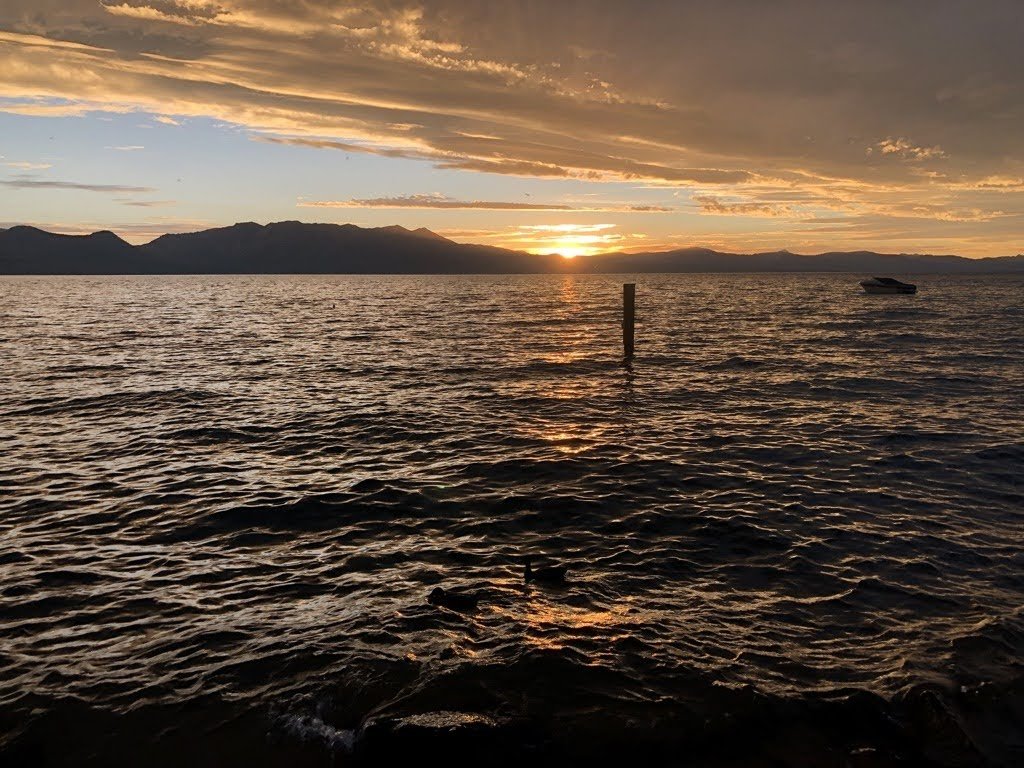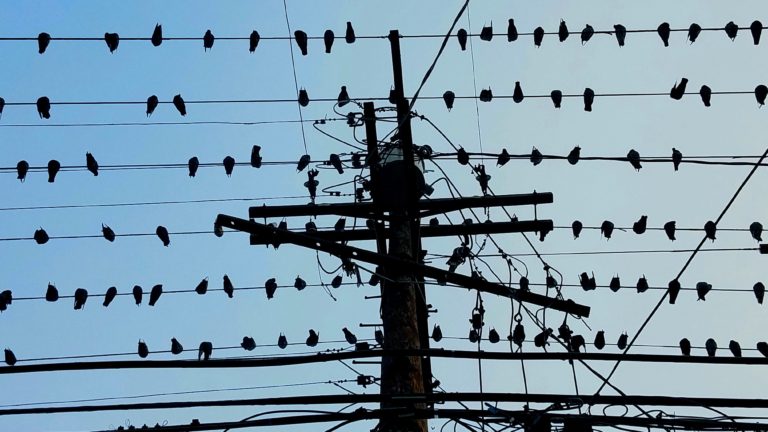Shoshauna Shy – Fiction
Bright sun. My eyes water. You are standing at the end of the point. On the horizon, Kirk and Matty...

THE ACCOMPLICE
circa 1972
Even before I roll over in bed, I can tell I’m waking up alone. Half of the quilt is whipped towards me, which means you got up in a hurry, Nick. We all agreed: the first one out of the cabin gets the honor of washing the supper dishes, but I don’t hear pots banging against rocks, and the cocoa kettle’s still lying in the fire pit. The air shimmers with summer heat and the sound of distant voices over water. I grab my jeans off the peg, unwrap my flatbraids and slide down the ladder. No Anita here either. I pull aside the canvas flap over the doorway.
Bright sun. My eyes water. You are standing at the end of the point. On the horizon, Kirk and Matty float back-to-back on the inner tube, legs dangling in the cold water. A small finch lands on a bough of the spruce in front of me, and its weight reveals a linen shoulder–Anita’s shoulder–level with your knees. For how long? She’s been with you how long? I crouch on the doorsill.
You point towards the eastern shore where a short ways inland, the spruce and hemlocks grow in a dense formation, and say what? Nick, you never have much to say first thing in the morning. Matty wanted to go round at breakfast and tell our dreams, but your grunt promptly killed that idea, thank God. Yet while Anita slept beneath the Hudson Bay blanket, did she uncurl and stretch into a corner of your dream? Perhaps she appeared at the bend in some mountain trail, shoulders brown as the fur of a doe, feet bare and slender, her shadow petite. And this is where the trail ended. I am certain you followed her there.
She stands up now, the long sleeves of her lacy shawl-blouse rippling in the breeze while you size her up anew beside this lake that’s as far north as you can go and still have June mean summer. Was supposed to mean our summer, Nick, but you invited Kirk to come, and of course that meant Matty, and How about this friend of hers whose lover got killed; she’s having a hard time? You set me up to expect some tear-stricken Sierra Club camper overcome by a need to divulge and rehash, not this near-mute who packed little else besides velvet skirts, then spent the first two days picking burrs out of them. I showed her the blueberry patch and how to listen for bears, and what to do to keep the fire going so the bread bakes evenly, but she hardly says a word to me, so what’s she saying to you?
She’s laughing! She does that? Oh, don’t you look cocky now, shuffling backwards, thumbs hooked in your belt, shoulder-length hair swinging. You do have the knack for drawing out the ladies, Nick; you practice it. You know how to listen to women; most men don’t. You do it for me when we’re on the el train and I’m telling you something. A whole bridge of cars could be sliding into the river, but you don’t even steal a glance; your concentration’s that strong. And when you talk to women (the pretty ones, that is), you use this low half-whisper that makes them believe what you have to say has never been said aloud before, and they got to lean in so they can hear you better.
But Anita hears you perfectly well on this still and child-fresh morning, the lake’s surface smooth and the breeze soft as silk. She sits down cross-legged on the rock. As you do the same beside her, I know you wish you had your guitar. Some people need coffee to jump-start their day; you need your guitar, need to strum it so the sound travels through your lungs, revs your engine. Most mornings while the rest of us swim, you sit on the wash bucket and work out chords, then I paddle back and put together a Swedish pancake batter, heat milk for cocoa; that’s our just-out-of-bed routine.
However, you have lowered one knee so that–I can tell!–it is almost touching Anita’s. But it was me, dammit, went back with her when the border guards wouldn’t let her through customs! When they wanted a passport and she thought an expired library card would do! You were ready to ditch her then and there; no patience for ignorance. I could have made Matty stay behind (Anita was her fault, after all), but instead, I volunteered. I went back with her across the border till parents sent her birth certificate.
Were it a melody, Sault Ste. Marie at sundown would sound about as stirring as Hark! the Herald Angels Sing the day after Christmas. The storefronts were shabby, and the grown men who passed us on the sidewalks looked worn and depressed, which was odd to see at the start of the growing season, especially in a locale where they’ve waited nine months for one. It was the kind of town where very little happens that goes unnoticed, which might explain why the sheriff offered us an overnight stay in the jailhouse. We took him up on it. It was that or a motel three miles down highway 75, and we didn’t have a car nor the money to blow. I thought it kind of him till he led us to a cell and locked the gate behind us. For your own safety, were his words–but weren’t the dangerous ones already locked up? The jail didn’t hold any other inmates. I would have slept better had he switched off the lights in the corridor, but those shone all night.
And that must have been the reason, Nick, Anita didn’t sleep. When the guard let her out at dawn to shower, I saw five spearmint gum wrappers on the floor and a sketchbook lying open with a pencil in its crease. I inched over on both elbows and paged through it. Barely-there portraits, half-finished poems, nothing remarkable. But on the front cover penned in green were the words Grant and That Life is Beautiful. Grant. The name of her late lover? I ran my fingertip over the dark grooves her pen had made in the cardboard. Had to have been written in gratitude before he died, in which case fate was far more cruel than I suspected. Suddenly it seemed that this book was not the property of a stricken woman, but that of a giving and trusting young girl whose nature, by a tragic turn of events, had transformed practically overnight. The slowness with which she moved made it seem like she struggled to maintain a deliberate motivation where no motion was without purpose. If this was caution, was it a result of the circumstances tied to Grant’s death? Oddly, nobody had told me how he died.
On that long morning while we did our post office check-in, buying our breakfast at a corner café called Mrs. Daisy’s (mediocre French toast made with Wonder bread), I was positive Anita was working her way around to confiding in me. Every moment while we chewed and sipped our meal, then climbed and swung on a deserted school playground was ripe for her confessions. I was convinced the next second would bring from her throat a rush of words, but when none came, I found myself resenting the best friend she had probably met and kept since a game of hopscotch in the first grade. That girl was probably privy to what Anita had gone through the past few weeks. Why didn’t she see me as an ally, Nick, when I was the one to go back to the U.S. with her? After a day and a half of her reticence, I was bored. Fed up.
So, I started talking. Not the trivial chit-chat we’d been batting back and forth, but real stuff. I made my words count. I told her about meeting my mother’s side of the family at age seven in the mountains of West Virginia, and how I came home talking Southern convinced my aunt Janet was my real mom. I told Anita about dancing with Morris Potter at my junior high graduation when womanhood arrived all over my white patent leather pumps, and about when my brother wiped out on his motorcycle, and it took me and the Zilch twins too long to lift it off him. She nodded slightly during the gaps between my paragraphs, slowing her pace to mine, a kindness in the tilt of her chin as she tried to hear me over a passing truck. The hem of her skirt swayed above the braided thread about her left ankle, and sand-colored skin showed between her waistband and her shirt when her weight shifted. One strand of her black hair brushed the center of her back as we walked from the laundromat to the 7-Eleven, and by then it was too dark to see. By then the streetlights were on, and we were back at the jail. As the guard turned the key in the lock, I finished describing the night I met you, which was a good place to stop; I didn’t want to go on. Setting aside my half-eaten turkey sandwich in its Saran Wrap, I spread my bedroll flat over the bunk and sat back against the cement wall, folded my hands in my lap and thought Okay, now her turn.
But she wasn’t talking. She was leaning over and unfastening the buckles of her suéde sandals. She was pulling from her knapsack a hairbrush and then seating herself on her bunk as she slid her feet free from her shoes one by one, and then began pulling the brush through the river of her long shining hair. Although she was sitting only four feet across from me, I felt more alone than I had all day. Finally, I leaned towards her and blurted, “Anita, how did Grant die? Were you with him?”
The brushing stopped. She turned and stared at me, and then tears began coursing down her face in a silver stream. I regretted what I’d done. Lowering her head, her voice was hoarse.
“In many ways, I still am. I’m sorry if this bothers you, Miriam.”
It was her saying my name that did it. I put my hand on her forearm. And then gently she placed her other hand right there on mine. A bomb could’ve gone off and I wouldn’t have heard it. The air took on a pinkened hue and behind my eyes, a white light pulsed. At last!
But she stood up and continued the brushing, and it became clear she was not going to say another word about him.
Or about much else. I blew it.
Her knees are drawn to her chin now, her skirt draping to the ground like a tent as she looks up at you intently. I see her face in profile. You’re smoothing your palms down over your thighs the way you do when you’re happy about something. Now, look, Nick, there’s nothing you could be telling her about this land that doesn’t include me, such as last summer when Old Man Shrire, who lives west of the bay motored his brats over to check us out. Elaborate on that, why don’t you? On how there were a bunch of us here when the little farts scooted up our beach like they owned the place, and the old man brought up the rear in his Havana-cabana shirt with the pineapples all over it. You stood on the rock with your can of Moosehead beer right about where you are now, and when he got to you, you greeted him with a Canadian accent so he wouldn’t know we were Americans. He looked around and asked How many boys; how many girls? Boys in the tent, eh, girls in the cabin? Or do you mix and match? You flashed him a sly smile like you were letting him in on something, which turned out to be the wrong thing to do.
Because that night, when all was still, he rows a boat over and he doesn’t bring the kids. He creeps into the cabin and finds me in the loft and hisses Hey, big blondie and quick as a flash, you got your hunting knife raised. It’s terribly dark but we all see the blade. Things get pretty crazy there till I make believe I’ll accommodate the old man long enough for you to go down and jump into his boat, threaten to go tell his missus where he is. Once he leaves, you make the most passionate love to me over there under those pines.
Which is not something you’re thinking about now that Anita is close enough that her knee is touching yours. I bet this makes a pressure soft as the paw of a Siamese cat through the cloth of your jeans. It has always been that for as long as we’ve been coming here, these woods welcome our presence; we’re not intruders. But I doubt Anita understands that because using sticks and sand to get pots clean or watching an animal give birth makes her queasy. When that snake showed up with the mouse head in its mouth yesterday and Matty ran for her camera, Anita went out back and threw up. She thought none of us saw.
But I saw, and what I’m seeing now is you coming up the path. You want your guitar. I dart into the cabin and note it’s leaning against the chimney like some casual accomplice. I grab my cookbook off the table and flip it open. Moist sugar makes the pages stick.
“Well! How long you been up?”
The recipes blur. You smell of woodsmoke and the wind from the north pole.
“Miriam? How long?”
“Not as long as Anita, I’m afraid.” I close the cookbook.
Your hand lifts my chin. “This was not going to happen.”
The tip of your thumb fits perfectly in the hollow of my neck. I used to panic when you touched me there, but I don’t anymore. I inhale and taste the metallic residue of cigarettes on your breath.
“She doesn’t need you,” I whisper.
“I know.”
“Anita needs no one.”
You nod.
“So, why do you want her?”
“For that reason.”
This shouldn’t be a surprise. If it’s possible to make your way across when no one else can, then you feel you’ve earned whatever it is you find on the other side.
I study the thin line at the center of your upper lip where your moustache doesn’t grow. Your hand is smoothing the skin at the back of my neck, a familiar weight on my shoulder. You lean over and brush your lips lightly on mine. “Miriam …” you murmur, “please.”
Please. The most important word in the English dictionary, as my mother liked to say. Only one syllable, but there’s no way to say that word quickly. Under your touch, I feel as tall and majestic as a Norway pine with a power we know is mine for the next ten or so seconds.
The sun is pouring in through the skylight, heating the crown of my head. It’s true that no matter how strong the sun shines, it never cuts through those hemlocks on the eastern shore. Even at high noon when your poncho is a blanket for me, that damp earth exudes a sweet chill. I see your poncho spread on that forest floor now, but not for me. I remember the long bone of Anita’s arm under my hand, her skin the color of cinnamon, the humidity of her breath touching my wrist like some breeze from a childhood evening. If only I could make her laugh.
“All right,” I hug you hard. “But with this one, you got to tell me everything.”
I push you away with both hands and you look me square in the eye. I wait a moment for gratitude to surface with your warm smile.
And then I hand you the guitar.
Learn more about Shoshauna by clicking on her bio: https://thievingmagpie.org/shoshauna-shy-bio-2/



